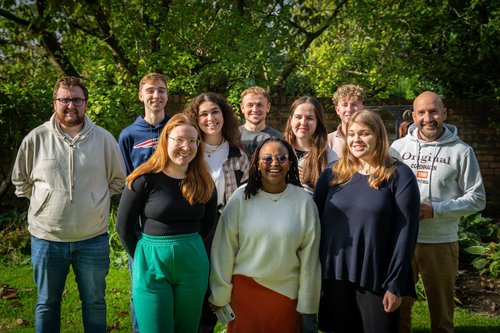Apprenticeship in Christian Ministry

Introduction to the Apprenticeship in Christian Ministry
Would you like to:
- Employ a young person for 12-18months at a reasonable rate of pay? with the costs of their Formal Academic Training being paid by the Welsh Government?
- and delivered by Coleg Sir Gâr and St Padarn’s Institute Coleg Sir Gâr (Essential Skills) and St Padarn’s Institute? (Level4 Mission & Ministry)
If so, keep reading about this Welsh Government Apprenticeship Framework in Christian Ministry designed to help young people Explore Christian Ministry in a 12-18 month paid position and complete the first year of a Theology Degree.
Our Apprenticeship programme is designed for those exploring a vocation in Christian Ministry (Vicar, Chaplain, Priest, Pastor, Minister, Youth/Children/Family Pastor) in any Christian denomination in Wales. It is primarily aimed at those who are 18 to 30*. This apprenticeship will be delivered by Coleg Sir Gâr and St Padarn’s Institute.
St Padarn’s Institute has a long established reputation for delivering high level theological training across Wales and beyond. Under its strap line, formation in community for mission, it seeks to play its part in equipping and empowering people across the world to communicate God’s transformative love. St Padarn’s will provide the theological training that underpins this apprenticeship framework.
Coleg Sir Gâr was created in 1985 and in 2013 became a Ltd Company within the University of Wales: Trinity Saint David Group. Coleg Sir Gâr has five campuses across Wales and employs around 800 staff. It has responsibility for ensuring the apprenticeship is being delivered as agreed and for providing the Essential Skills outlined below. They will do this by keeping in contact with apprentices and employers, providing advice on issues of employment etc and arranging occasional onsite visits.
*The age range can be higher for the right applicant.
How the programme works

Apprentices will work 30 hours a week (typically for a local church or group of churches but could also be a para church organisation, hospital (in the case of chaplaincy) or a coordination centre (head office, theological college etc). The nature of this vocation means the pattern of working will be highly flexible. However, if a day is considered to have three sessions (morning, afternoon, and evening), the apprentice should not be asked to do more than 10 sessions across the week. Most weeks, one of those sessions (Monday morning) will be set aside for the training programme.
The other sessions will involve a wide range of duties and responsibilities as agreed with you the employer, eg, preparation for bible studies, developing publicity, engaging with social action initiatives, setting up for meetings or events, helping with the coffee shop and family/youth/children’s ministry. And the whole time learning to reflect on their practice. The two elements of working and reflecting are key. The programme is flexible enough for it to be tailor made to the ministry area of choice whether that be in student ministry, children’s ministry, youth ministry, chaplaincy to schools, pastoral care, justice programmes, street pastors or general all rounder. Undoubtedly you will have specific areas that you want apprentices involved in and these will be indicated in the job description or initial interview.
The Training Programme
All successful applicants will do a Higher Apprenticeship which means on completion they will receive a Level 4 qualification in Ministry & Mission which will be accredited by University of Wales Trinity Saint David. In effect, completing the first year of a theology degree. These are the modules within that Programme:
| 1. Using Christian Doctrine | 2. Using Christian Mission |
| 3. Using Practical Theology | 4. Using the Old Testament |
| 5. Using the New Testament |
6. Reflecting Theologically in a Workplace Context |
Additional Level 2 Training is available in the following Essential Skills, for Apprentices who may need some extra input to complete the training programme:
- Communication / Literacy
- Welsh Language
- Application of Number
- Digital Literacy
Delivering the Programme

As previously mentioned, the teaching element of this apprenticeship is delivered over 3 hours every Monday morning. The teaching programme will usually follow the below pattern. The preference will be that apprentices gather with others at a central location. But we recognise that Welsh geography doesn’t always allow for this.
8:30am -Breakfast Together where possible
9:00am -Worship & Prayer (in geographical cohorts where possible, otherwise individual time
9:30am -Teaching either on Zoom or in Facilitated Learning Groups[1]. Materials will be provided
10:30am-Tea/Coffee Break
11:00am -Facilitated Discussion Groups
12:00noon - Finish
Three of the modules will be taught in this way. Two more modules will be taught at our purpose built centre in Llandaff over two short and one longer residential. The dates are outlined below:
| WEEKLY | |
| 1. Using Christian Mission |
Autumn: 16 September 2024, 23 September2024 , 30 September 2024, 7 October 2024, 14 October 2024, 4 November 2024, 11 November 2024 , 18 November 2024 |
| 2. Using the New Testament | Winter: 13 January 2025, 20 January 2025,27 January 2025, 3 February 2025,10 February 2025, 17 February 20253 March 20251,0 March 2025, 17 March 2025, 24 March 2025,31 March 2025,7 April 2025, |
| 3. Using Christian Doctrine |
Spring: 28 April 2025 ,12 May 2025 ,19 May 2025, 2 June 2025, 9 June 2025, 16 June 2025 |
| RESIDENTIALS | |
| 4. Reflecting Theologically | 20th – 23 October 2024 Sunday to Wednesday |
|
5. Using the New Testament 6. Using Christian Mission |
30 June to 3 July 2025 Sunday to Wednesday |
Salary
Approved Apprenticeships in Wales are fully-funded by the Welsh Government which means you don’t have to pay for their training programme. This funding will cover all the costs of the registration, delivery and certification of all qualifications within the apprenticeship framework. Although all training fees are covered, the local Church / Benefice / Circuit / Mission/Ministry Area will employ the apprentice and will need to renumerate them a minimum of £226.50 a week. However, if you can provide accommodation, then that figure becomes £74.62*. This is based on the full time/30hours pattern mentioned earlier. But it is also possible to undertake a part time apprenticeship at a minimum of 16hours a week*. Both these options attract the free training programme funded by Welsh Government.
*While these numbers are based on best estimates, you should check with the employer. Although £7.55 per hour is the minimum wage for apprentices. So, no employer can pay below this.
*The minimum wage is still £7.55 an hour. But accommodation can still be used to offset this figure. But it is in your hands as an employer if you wish to offer this option.
*This hourly rate rises to the national living wage rate in year 2 but the housing allowance will still apply.
Holidays
Apprentices receive 20 days paid holiday per year, plus bank holidays. But they should ensure that holidays are not taken when there are residentials or teaching mornings.
Additional Funding
There are often incentives advertised by Welsh Government that those employing apprentices on an approved Apprenticeship Framework can apply for. In previous years the Government have offered a flat rate grant for those employing apprentices. This year the funding is available for those employing apprentices who have a disability. Because of the recognised importance of introducing younger people to church leadership, some national offices/diocese/regions may also provide grant funding at various levels. It is always worth making the enquiry.
Assesment
There are no exams or mid term test for apprentices. Three of the modules will be assessed by essays (3,000 words), but given the nature of this apprenticeship, two will be assessed by means of portfolios looking at specific areas of ministry – and will likely include a presentation part to practice public speaking. The final module will be assessed by a written reflection, on their time with you incorporating diary entries if appropriate. And there is of course additional learning support available for those who should need it.
After the Apprenticeship
The apprenticeship with its Level 4 qualification attached will open up several career routes:
- It is hoped that a number of those who take this apprenticeship would explore ordination within their particular denomination during the year to 18months and at the end of their time as apprentices would go on to enter the next stage of that as set out by their denominational practices6 –
- Some may go on to full employment with those who employed them as apprentices, possibly as youth/children’s workers, pastoral assistants or a wide range of other employment opportunities.
- A e apprentice will qualify with a first year degree qualification. They will be able to enter University and do Level 5 and Level 6 to complete a degree in the following two years.
Entry Requirements and recruiting an apprentice
There are no formal entry requirements for this apprenticeship. But we would expect:
- Trust, integrity and honesty are all characteristics valued by employers in the Church/Ministry services sector.
- DBS checks are essential as employees may well find themselves working with vulnerable adults and children.
- Most churches will require at least 12months experience of a Church Community
There are two ways of applying for an apprentice:
- If you already have people in mind, or have recruited/identified through your internal processes, the drop me an e-mail on the e-mail below and we will help make that happen.
- E-mail the address below, expressing an interest and we will then get back to you and ask for further information in order to match you with the right apprentice.